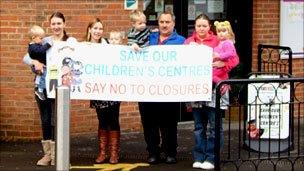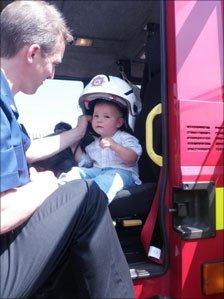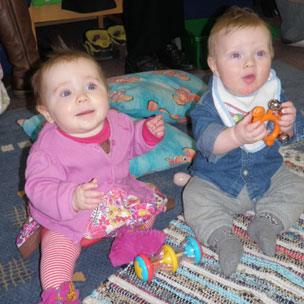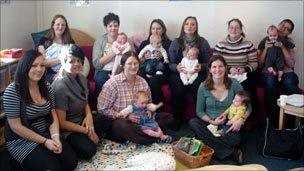Parents defend children's centres 'lifeline'
- Published

Parents have been campaigning in Stoke against planned closures
Millissa Beydilli was sinking into a deep, dark hole when she turned to her local children's centre for help, she says.
The first-time mother was struggling to cope with her bright but demanding toddler, had become depressed, and no longer felt comfortable being around him.
"Everybody told me I was depressed but I just batted it away, but you know I was crying every day," she says.
"I would never have gone to a doctor - I didn't believe depression existed."
Staff at the Blurton Children's Centre, in a deprived part of Stoke-on-Trent, helped her turn things around.
"They broke it all down and helped me learn to be around my child again," she said.
"They taught me to help him play calmly, rather than everything being off the Richter scale."
The Blurton centre is one of seven in Stoke being ear-marked for closure by the local authority.
The council has to find £40m savings following a tough settlement from central government as it seeks to tackle the national deficit.
And Millissa, who has since become a family worker at the centre, is now leading a campaign to save similar centres threatened with closure in the city.
She says: "These teams have taken so many people away from dark places. What would they have done if the children's centre wasn't there for them?"
"So many relationships have been built up with hard to reach families - if these centres close - they will never gain access to them again."
These are the very people that ministers want England's 3,500 Sure Start children's centres to target. They say that in some cases the centres have failed to reach the parents who need the most help.
'Branded'
Children's minister Sarah Teather says councils are "facing difficult decisions", but have a legal duty to provide sufficient children's centres to meet local need.
Ms Teather says there is enough money in the system to maintain the current network, but is clear that their resources should be "channelled towards those who will benefit the most".
But a group of parents opposing cuts to four centres in Exeter run by the charity Action for Children, fear that specifically targeting deprived families risks changing the centres beyond recognition and stigmatizing those using them.

There are sessions for fathers as well as mothers
Laura Robinson, who co-ordinates a forum for users of the Exeter centres, warns that parents won't want to be "branded" or "seen as needy parents".
Another first-time mother, Kate, says: "The centre is a real life-line in the community, without a finger-pointing health visitor coming into your house saying, 'You need help'."
She says the sense of support that parents get from sharing their difficulties with each other is invaluable.
She adds: "If people are sitting at home by themselves then they may well think they are the only ones with the problem.
"But then they go and find out there are other people crying at 4am and it makes it OK."
She also points out that the staff working in the centres have years of experience and are able to spot when someone is starting to struggle and can gently offer help.
"People can be frightened to ask for help - they think they will get in trouble if they admit they are having problems," she adds.
Although Devon County Council has pledged not to close any of its children's centres, it acknowledges that there maybe reductions in their opening hours.
Christine Cottle, who manages the four Exeter centres, says the budget cut of around 10% that she is expecting will lead to classes being cancelled and services reduced.
And it is the classes that get parents from all walks of life through the door.
These range from baby massage classes, breastfeeding support and stay-and-play sessions for parents and their children, to nurture groups helping young children with identified problems get ready for school and support for teenage mothers.
Ms Teather has suggested that parents who can afford to should pay for such services. So could charging help make up the shortfall?
In the centres Mrs Cottle oversees, there is a box asking for a suggested donation of £1.

Many children's centres offer stay and play sessions
She admits that some parents have wanted to contribute more for the services they use, but adds: "I think we would have to be very careful that if we started to make it means-tested that it doesn't end up stigmatizing some people.
"The whole point of this is that it crosses societal boundaries. We are all in the same boat - the one thing that you have in common is that you have a baby."
'Ghetto for disadvantage'
Denise Burke, who used to head youth and childcare for the London Development Agency and now runs a social enterprise group, United for All Ages, says ministers tend to see disadvantage only in economic terms.
She acknowledges there is no reason why someone from a richer background should be a better parent.
"There are lots of kinds of disadvantage - whether it's domestic abuse or alcohol abuse - it doesn't have to be financial disadvantage."
Nonetheless, she says there is a place for charging for some services.
"It's not that different from turning up at the dentist or optician," she says.

Children's centres offer a wide range of services for parents and their children
She has been working with local authorities on how they can make centres more sustainable by bringing in services for wider groups, such as those for the elderly or young people.
"What I am not happy about is turning these buildings into what may amount to a ghetto for disadvantage," she says.
- Published28 January 2011